
No. 6, 2023 | 2 June 2023
Go to:
From FRSA's Executive Director
FRSA’s National Conference 2023 did not disappoint!
Feedback from delegates has been overwhelmingly positive saying they thoroughly enjoyed the mix of keynotes, panels and concurrent sessions presented at the Conference this year. The value of face to face engagement was alive and well and there was much shared and learnt outside of the formal sessions as well. You can read more about it below. In addition, it is always our intention to showcase the work presented at Conference as broadly as we can, and we will be working on uploading the videos from the keynotes and panels as well as the concurrent session slides (where we have permission to do so) over the next week or so. To access the PowerPoint presentations from Conference, download the PDF version of the program and click on the session you are interested in. Also don’t forgot to see all the fabulous photos from the week on the Conference webpage.
To make sure you don’t miss out in 2024 – I am delighted to let you know that we will be taking National Conference 2024 to Melbourne from 13 – 16 May – the Pullman Melbourne on the Park 2024 will be the venue. Be sure to mark the dates in your diary!
This week is National Reconciliation Week and I really want to acknowledge and pay my respects to the amazing Aboriginal and Torres Strait Islander men and women in our network. The difference you make each and every day should never be underestimated, and it was so good to see strong presentations made about the sector’s work with Aboriginal and Torres Strait Islander children, young people, men, women and communities as part of the Conference showcasing opportunities. Many of these were presented by (or included) Aboriginal and Torres Strait Islander people in our network.
The theme of ‘Be a Voice for Generations’ puts out a call to action in supporting the Voice to Parliament – which we have done.
The Reconciliation Australia website has a lot of fabulous resources and information and I was struck by the following passage on their page:
“Reconciliation must live in the hearts, mind and actions of all Australians as we move forward, creating a nation strengthened by respectful relationships between the wider Australian community and Aboriginal and Torres Strait Islander peoples.
“We all have a role to play when it comes to reconciliation, and in playing our part we collectively build relationships and communities that value Aboriginal and Torres Strait Islander peoples, histories, cultures and futures”.
You can also get a sense of the range of reconciliation activities going on in the FRS sector in the ‘Member News’ section below.
Please do take the time to read through the FRSA eBulletin this week – there is a lot going on. In particular, I did want to draw your attention to a webinar we are providing for members, on the back of the FRSA Conference. Professor Ben Mathews presented on the Australian Child Maltreatment Study he authored (as lead) as part of the Early Years panel on the first day of the Conference. The findings of that study evoked gasps of shock and concern in the audience. What we do with that information is most important and we will be doing some work on that front. But first, we really wanted to make sure the findings themselves are broadly known and understood.
Kind regards,
Jackie Brady
FRSA Executive Director
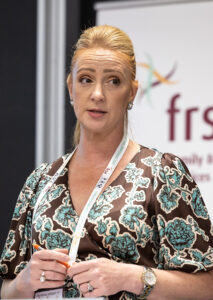

FRSA National Conference 2023 – Services within Everyone’s Reach: Choice. Connection. Collaboration
FRSA held its annual National Conference at the Gold Coast Convention and Exhibition Centre, 15-18 May, on the beautiful lands of the people of the Yugambeh language region.
It is always a pleasure to bring the sector together to share research, practice learnings and insights and we were thrilled to have over 550 delegates join this year’s conference – a new record! Practitioners, academics and policy makers working to support children, families and communities came together to reflect on the question: what does it really mean to put services within everyone’s reach?
The week started with four well subscribed pre-Conference workshops:
- Aboriginal & Torres Strait Islander Workshop – Dadirri: Ancient Aboriginal Mindfulness Traditions presented by We Al-li
- Communities for Children Facilitating Partner (CfC FP) Workshop
- Family Law Workshop
- Balancing reporting requirements and meaningful data collection. How to make data work for you and your funders facilitated by the Evidence and Evaluation Support team at the Australian Institute of Family Studies.
On Tuesday 16 May, we were honoured to have John Graham – a Traditional Custodian of the Gold Coast region, a Kombumerri man, a saltwater man of the Gold Coast part of the wider Yugambeh Language Group – provide a gracious Welcome to Country.
The Hon Amanda Rishworth MP, Minister for Social Services provided a live-streamed opening address. This was followed by a keynote address from Catherine Liddle, CEO, SNAICC – National Voice for our children. Catherine spoke persuasively to the topic Stronger ACCOs, Stronger Families -driving reform to Close the Gap for Aboriginal and Torres Strait Islander families.
Our first panel discussion – The Early years: giving every child the best start in life– was chaired by the National Children’s Commissioner, Anne Hollonds and brought together experts from early education, health, government and child maltreatment research to respond to the question: what will it take to ensure that every child born in Australia has the opportunity to reach their full potential? Panellists included:
- Catherine Chamberlain, Director of Onemda Aboriginal and Torres Strait Islander Health and Wellbeing at the Melbourne School of Population and Global Health, The University of Melbourne
- Ben Mathews, Principal Research Fellow in the School of Law at Queensland University of Technology
- Annette Michaux, Member, National Coalition for Child Safety Steering Group
- Samantha Page, CEO, Early Childhood Australia
- Tarja Saastamoinen, Group Manager, Families, Department of Social Services.
Day two of the Conference opened with another great plenary line-up. Attorney-General, the Hon Mark Dreyfuss KC MP provided a pre-recorded address, acknowledging the work of the family and relationship services sector and outlining recent government measures towards making the family law system safer and simpler for separating parents and their children.
This was followed by a keynote address by Micaela Cronin, Australia’s first Domestic, Family and Sexual Violence Commissioner. Micaela grounded her presentation in her experiences as a social worker in family violence and sexual assault services and how these experiences have shaped her vision of the role of national leadership in ending violence against women and children.
Panel discussion two – Upholding children’s rights in the family law system – brought together four panellists to respond to the questions: to what extent does the family law system uphold the rights of children and young people? How can we enable children and young people to participate in family law decisions meaningfully and safely? This rich discussion was chaired by Dr Rae Kaspiew, Australian Institute of Family Studies and the panel included:
- Chris Collett – First Assistant Secretary, Family Law, Attorney-General’s Department
- Megan Solomon – Practice Lead Counselling, Uniting NSW
- Dr Georgina Dimopoulos – Socio-legal researcher, Southern Cross University
- The Hon John Faulks – Family Law Council.
The great richness and diversity of the sector was showcased each and every day in the concurrent session program. With over 65 presentations and five symposiums, we felt privileged to bring this part of the program to delegates, sourced from our network and related stakeholders. Slides from these presentations will be made available via the FRSA Conference page subject to author permission. Keynote presentations and the Panel Discussions will be uploaded to FRSA’s YouTube channel in the coming weeks.
The Conference closed with an engaging, thought provoking and, at times, deeply sobering talk by Walkley-Award winning journalist and author, Jess Hill. Jess spoke to the issue of coercive control and, importantly, how a paradigm shift in the way we understand domestic violence and coercive control can enable a more effective response.
Gala dinner
The work our sector does is deeply rewarding but also hard. The Conference Gala Dinner provides an opportunity to come together, relax and celebrate all that the sector has achieved over the previous year.
We were delighted to have the Yugambeh Aboriginal Dance Group perform at the dinner providing an insight into local First Nations culture by sharing ancient knowledge through traditional songs, stories, and dance.
Local band, the Baker Boys Band kept people dancing till the reluctant close of the evening!
Federal Budget 2023-24
The Government handed down the Federal Budget 2023-24 on Tuesday 9 May.
The main concern on the minds of many, including FRSA, was the measures the Government would take to lift the living standards of the most financially disadvantaged people in our community. While the announced measures to assist people on low incomes demonstrated the Government is aware change is needed, they were delivered in, as one commentator put it, “homeopathic” doses, which will have limited impact on people doing it tough as the cost of living continues to rise.
Increases to JobSeeker and related payments were welcomed, but still fell well short of the recommended increase by the Economic Inclusion Advisory Committee. The 15% increase to Rent Assistance, while acknowledged as the first real increase in over 30 years, simply won’t do much against the stark reality of Australia’s rental housing market.
The Social Services sector is awaiting more detail on three key aspects of the Budget:
- Women’s Safety measures, including measures specifically for First Nations women (Budget Paper no. 2, p. 88, p. 90)
- Measures ‘targeting entrenched community disadvantage’ (Budget Paper No. 2, p. 206)
- Indexation funding increase helping organisations address cost and wage pressures (Budget Paper no. 1, p. 104 & p. 199).
ACOSS provided a helpful summary response to the Budget, which can be accessed here.
The Parliamentary Budget Office has released a 2023-24 Budget Snapshot and a Guide to the 2023-24 Budget.
Budget papers are available online.
New data reveals Australian wellbeing has hit an all-time low in the midst of an ongoing polycrisis
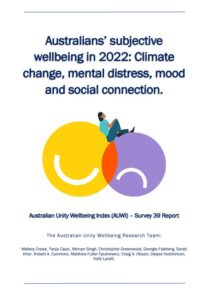 As part of an enduring partnership spanning more than two decades, Australian Unity and Deakin University have released their latest Wellbeing Index Survey Report, measuring the subjective wellbeing of over 2,000 Australian adults against a series of personal and national life domains.
As part of an enduring partnership spanning more than two decades, Australian Unity and Deakin University have released their latest Wellbeing Index Survey Report, measuring the subjective wellbeing of over 2,000 Australian adults against a series of personal and national life domains.
The new Report, detailing survey data collected in May 2022, found Australia’s subjective wellbeing declined across all measures as the country faces a polycrisis of cost-of-living pressures, climate change and global uncertainty, amidst an ongoing health pandemic. This marks the first time in over a decade that such a consistent downtrend has been observed across all wellbeing measures.
Key findings:
- Satisfaction slides: Australians’ overall life satisfaction has fallen to the lowest score on record.
- Young Australians are struggling: 18-25 year-olds’ wellbeing has hit an all-time low and they recorded the highest levels of mental distress and climate worry.
- Multiple crises put pressure on wellbeing: More Australians on average scored below the normal range for personal wellbeing, including those under 56 years of age, on a household income below $60,000 and those in casual work or unemployed.
Mission Australia’s Homelessness Impact Report reveals rising demand for services
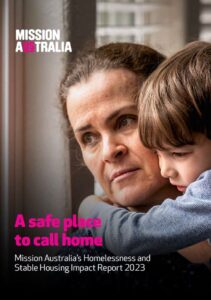 Mission Australia’s newest report A Safe Place to Call Home – Mission Australia’s Homelessness and Stable Housing Impact Report 2023 reveals that demand is rising for the charity’s homelessness and housing services, spurring calls for urgent action to end Australia’s homelessness and housing emergency.
Mission Australia’s newest report A Safe Place to Call Home – Mission Australia’s Homelessness and Stable Housing Impact Report 2023 reveals that demand is rising for the charity’s homelessness and housing services, spurring calls for urgent action to end Australia’s homelessness and housing emergency.
The report shows a 26% increase in demand for Mission Australia’s homelessness services over the past three years, and a 50% increase in people who are seeking help after they’ve become homeless rather than when they are at risk.
The report demonstrates that homelessness can be ended if the right supports, services and housing are in place, and if there is a focus on prevention. Of the people who approached Mission Australia’s services before they became homeless, 94% were supported to remain living in their home and avoid homelessness.
The longer Mission Australia’s staff were able to provide support to people experiencing homelessness, the more likely those people were to exit homelessness. However, efforts to find long-term housing for people once they become homeless are severely constrained by the lack of affordable housing available right across the country. Mission Australia and other homelessness services are only able to find a secure long-term home for a third (31%) of people experiencing homelessness.
CCS accreditation online information session
The Attorney-General’s Department is hosting an online information session of their Children’s Contact Services (CCS) accreditation presentation which was first presented at the Australian Children’s Contact Services Association (ACCSA) forum earlier this year.
Children’s Contact Services – Presentation on information related to accreditation
When: Tuesday, 6 June 2023, 11:30am AEST
Join link: https://ag-au.webex.com/ag-au/j.php?MTID=m60e060cb83dd5a69f3a90d52f827bc1f
Webinar number: 2650 341 9267
Webinar password: Y5Znp3284p8 (95967328 from phones and video systems)
Join by phone: +61-2-9338-2221 Australia Toll
Access code: 265 034 19267
The session will run for approximately 1 hour, with 30 minutes allocated to a formal presentation and 30 minutes allocated for a Q&A session. The presentation will cover work completed to date, and next steps in the project. There will be an opportunity to ask questions on the day, however it is recommended that questions be submitted in advance, by email to ccsaccreditation@ag.gov.au. The session will be recorded and made available to anyone who may not be able to attend live on the day.
FRSA Members Only Webinar: Findings of the landmark Australian Child-Maltreatment Study
Coming off the back of the FRSA National Conference 2023, FRSA is hosting this Members Only webinar. All staff in our Member Organisations are able to register.
Webinar: Findings of the landmark Australian Child-Maltreatment Study
Thursday, 15 June 2023 | 11:30am-12:30pm (AEST)
Lead Investigator of the first Australian Child Maltreatment Study, Professor Ben Mathews, joined an Early Years Plenary Panel discussion at the Conference to bring the findings of the study to bear on the question: what will it take to ensure that every child born in Australia has the opportunity to reach their full potential? During his participation in this panel – he presented some of the shocking and deeply concerning results of this Child Maltreatment Study. Many in the audience were quick to identify that there would be crossover between the children in the FRS services and those children that are represented in the Australian Child Maltreatment Study.
The results from this study present a compelling case for further action to better support children, parents and families – especially in the prevention and early intervention space. This webinar provides an opportunity for Members to hear the study’s findings in-depth so that we, with our members, can begin looking at ways to strengthen the sector’s role in supporting child wellbeing in practical and meaningful ways. And, as a consequence – actively contribute to the reduction of child maltreatment in the future.
The Australian Child Maltreatment Study is the first Australian survey to identify the national prevalence of all five forms of child maltreatment – physical abuse, sexual abuse, emotional abuse, neglect, and exposure to domestic violence – and their associated mental health disorders, health risk behaviours, physical health conditions, and burden of disease. The ACMS surveyed 8500 Australians, including 3500 young Australians aged 16-24, to identify historical and contemporary trends in these maltreatment experiences and associated outcomes. This presentation will discuss key findings from the ACMS, including results about: (1) the prevalence and nature of children’s exposure to domestic violence; (2) its associated outcomes; and (3) the overlap between children’s exposure to domestic violence and their experience of other types of child maltreatment.

Early Years Strategy and Measuring What Matters: FRSA submissions
Over the past few weeks, FRSA has made submissions to two government consultations: the Department of Social Services’ public consultation on the Early Years Strategy and the Treasury’s Measuring What Matters consultation phase 2. Both these consultations are now closed.
The Early Years Strategy is being developed to help the Commonwealth create a more integrated, holistic approach to the early years and better support the education, wellbeing and development of Australia’s children. You can read FRSA’s submission here.
The first Measuring What Matters Statement is due to be released later this year providing a wellbeing framework for Australia. Phase 2 of the Treasury’s consultation focused on five emerging policy themes arising from phase one of the consultation. You can read FRSA’s submission to phase 2 here.
Inquiry into the Aboriginal and Torres Strait Islander Voice Referendum: Report and Government Response tabled
The Joint Select Committee on the Aboriginal and Torres Strait Islander Voice Referendum tabled its report on the provisions of the Constitution Alteration (Aboriginal and Torres Strait Islander Voice) 2023 on 12 May. The legislation sets up the referendum on enshrining an Indigenous Voice to Parliament in the constitution.
The Committee recommended that the Constitution Alteration be passed unamended.
The Government tabled its response to the Committee’s report on 23 May 2023, supporting the Committee’s recommendation.
FRSA submitted a short letter of support for the Bill in its current form. This is available on our website.
The Bill passed the House of Representatives on 31 May and it is expected it will be considered by the Senate in June.
FRSA’s position on a Voice to Parliament is also published on the FRSA website.
Public consultations
Family Law Amendment Bill 2023
The Senate Legal and Constitutional Affairs Committee is currently inquiring into the Family Law Amendment Bill 2023.
The Bill, which was introduced to Parliament following a public consultation by the Attorney-General’s Department earlier this year, aims to ensure that the best interests of children are placed at the centre of the family law system and make the family law system safer and simpler for separating families to navigate. FRSA’s submission to that consultation is available here.
The Family Law Amendment Bill 2023 will primarily amend the Family Law Act 1975, with some consequential amendments to the Federal Circuit and Family Court of Australia Act 2021.
Submissions close 23 June 2023 and the Committee is due to report by 24 August 2023. Information about the inquiry, including the draft Bill and explanatory memorandum, is available on the Committee’s webpage.
National Strategy for the Care and Support Economy: Public consultation
The Government is developing a National Strategy for the Care and Support Economy and public consultation on the draft strategy is now open.
The draft strategy sets out a vision, goals, policy objectives and a road map of actions to a sustainable and productive care and support economy that delivers quality care and decent jobs.
The Strategy focuses on improving the quality of care and support jobs within four key sectors – early childhood education and care, disability support, veterans’ care and aged care.
Consultation is open until 26 June 2023. The draft National Strategy for the Care and Support Economy and information about how to provide feedback is on the Department of Prime Minister and Cabinet website.
Senate Select Committee on the Cost of Living: interim report
The Senate Select Committee on the Cost of Living have released the interim report summarises the evidence that has been presented to the Committee so far. It focuses on three themes that were identified as priority areas – namely energy prices, housing and food and groceries. Read the full report here.
Family Relationships Services Program (FRSP) performance reporting
The Attorney-General’s Department (AGD) has advised it will be reporting on a new performance measure for the Family and Relationships Services Program (FRSP) in its upcoming 2022-23 annual report, as part of a whole-of-government process underway to improve performance measurement. It is intended that the new performance measure better reflects that the program is being managed to deliver outcomes to the community. The key indicator for this measure will be that 100% of Family Law Service grant recipients provide services in line with their approved grant activities. This replaces a previous measure based on procedural elements relating to grant management, which no longer conforms to evolving government performance reporting frameworks.
If you are delivering programs under the Family and Relationship Services Program funded by AGD you should receive more information from the Department shortly, setting out the intent of the performance reporting and the process which is required to meet Australian National Audit Office standards. The process will require that a random sample of grants and associated 2021-22 AWP reports are assessed by an external provider. AGD has advised that once random sampling has been completed you may receive further correspondence. If selected in the random sample your organisation will be further contacted by the firm undertaking the independent validation, as further information may be sought to provide the required independent assurance of activity. AGD advises that the performance measure and the random sampling is not reflective of particular concerns with any specific grant recipient, but is an important process to robustly report on the FRSP to the Australian public.

National Reconciliation Week
It’s National Reconciliation Week (NRW) this week from 27 May to 3 June. The week is a time for everyone to learn about our shared histories, cultures, and achievements, and to explore how each of us can contribute to achieving reconciliation in Australia.
Keep up the momentum for change: the theme for National Reconciliation Week 2023 is ‘Be a Voice for Generations’. The theme encourages everyone to be a voice for reconciliation in tangible ways in our everyday lives – where we live, work and socialise.
For the work of generations past, and the benefit of generations future, act today for a more just, equitable and reconciled country for all.
See how FRSA Members around the country have been celebrating the week:
- AnglicareNT commenced Reconciliation Week with an online welcome event where staff read the Uluru Statement from the Heart and shared thoughts and feelings on reconciliation. And a representative for the Yes Campaign, shared a conversation with their staff on the Voice to Parliament, referendums and how they work and the Yes Campaign.
- Meli staff across Geelong, Warrnambool, and Colac participated in their annual National Reconciliation Walk. And also held a special panel event where panelists, Aunty May Owen, Hayley Bohem, Jessica McDonald and Tracie McPherson shared their thoughts on Reconciliation, Voice to Parliament and how we can all contribute to reconciliation in our everyday lives.
- Lutheran Care sponsored and attended Reconciliation South Australia’s NRW Breakfast. And their Foster Care team took part in the Reconciliation in the West event.
- OzChild’s foster carers, Aboriginal Practice Leads and their foster care program team for a Yarning Circle event at Nairm Marr Djambana.
- The Salvation Army’s Aboriginal and Torres Strait Islander team partnered with Crossway Baptist Church in Melbourne to develop the COACH (Creating Opportunities and Casting Hope) Indigenous Program.
- Baptist Care SA held a free BBQ, featuring live music, free barber haircuts, arts and crafts, face and body painting.
- Parkerville Children and Youth Care’s team gathered at the Stan & Jean Perron Advocacy Centre in Midland to launch the week.
- Centacare Catholic Family Services shared the story of their Senior Aboriginal Workforce Coordinator, Trent Wingard and his determination to empower others to find their sense of purpose, by opening up career pathways for Aboriginal and Torres Strait Islander peoples in community services.
- Anglicare’s Albury office held a Wear It Yellow Day to raise funds for Children’s Ground.
- BaptistCare launched their Reflect Reconciliation Action Plan as part of the week.
- The City of Greater Geelong marked the week with a series of projections on buildings around the city celebrating the work of First Nations artists.
- Centrecare Inc’s Perth staff held a morning tea and watched a panel livestream – “Constitutional Reform: What it means to non-Indigenous voters (Non-Indigenous Panel)”. While their Cannington staff got together for a “National Reconciliation Week Virtual Breakfast: WA”.
Have you used a service at Relationships Australia Victoria between 1948 and now? Share your story for the chance to win
 In 1948, the Marriage Guidance Council of Victoria was established to support couples and families experiencing relationship difficulties following the Second World War.
In 1948, the Marriage Guidance Council of Victoria was established to support couples and families experiencing relationship difficulties following the Second World War.
In 2023, the organisation now known as Relationships Australia Victoria (RAV) will celebrate its 75th anniversary. RAV is inviting clients, students and training participants from across their history to share how the organisation has positively impacted them.
Stories such as these can help other people understand how services such as RAV’s can make a difference and encourage others to seek support. Tell your story before 30 June for the chance to win one of five, $50 Coles gift cards. Click here to have your say
National Families Week
National Families Week was on 15-21 May 2023. This year’s theme living real, dreaming big celebrates the importance of individual, family and community systems in influencing and supporting family wellbeing, safety and resilience.
See how FRSA Member celebrated the week below:
- CatholicCare Wollongong hosted a free family movie screening.
- Centacare Bathurst held a Family Day Out community event
- CatholicCare Sydney shared some tips on how to improve family relationships.
- Anglicare Southern Queensland shared a video showcasing a range of free parenting programs.
- Mercy Community shared stats on how many families their Families & Young People teams have supported over the past year.
- The Australian Institute of Family Studies shared their involvement at the FRSA National Conference, where they showcased their latest research.
- Centacare New England North West shared photos of their staff travelling to the Gold Coast for the FRSA National Conference and presenting during the Conference.

Call for submissions: Youth Justice and Child Wellbeing Reform across Australia
 The National Children’s Commissioner is conducting a project that investigates opportunities for reform of youth justice and related systems across Australia, based on evidence and the protection of human rights. The project will explore ways to reduce children’s involvement in crime, including through prevention and early intervention.
The National Children’s Commissioner is conducting a project that investigates opportunities for reform of youth justice and related systems across Australia, based on evidence and the protection of human rights. The project will explore ways to reduce children’s involvement in crime, including through prevention and early intervention.
The National Children’s Commissioner invites submissions from organisations and individuals aged 18 years and over on the following questions:
- What factors contribute to children’s and young people’s involvement in youth justice systems in Australia?
- What needs to be changed so that youth justice and related systems protect the rights and wellbeing of children and young people? What are the barriers to change, and how can these be overcome?
- Can you identify reforms that show evidence of positive outcomes, including reductions in children’s and young people’s involvement in youth justice and child protection systems, either in Australia or internationally?
- From your perspective, are there benefits in taking a national approach to youth justice and child wellbeing reform in Australia? If so, what are the next steps?
Submissions are limited to a total of 3000 words. Attachments or links to previously published work may be included in the submission, for example research papers.
Submissions must be sent to the following email address: youthjusticereform@humanrights.gov.au. Submissions close on COB Sunday 18 June 2023.
Webinar series: Supporting children’s mental health during parental separation
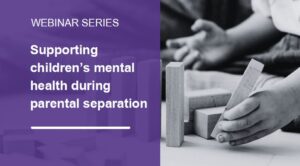 The National Family Law Pathways Networks in collaboration with Emerging Minds are hosting a four part webinar series on supporting children’s mental health during parental separation.
The National Family Law Pathways Networks in collaboration with Emerging Minds are hosting a four part webinar series on supporting children’s mental health during parental separation.
Recent amendments to the Family Law Act provide Family Law Practitioners with a unique opportunity to uphold the voice of children in separating families and promote children’s social and emotional wellbeing and mental health.
This series is offered as a scaffolded learning opportunity and engagement in the full series is encouraged. For more information and to register for the webinars, please download the brochure.
Webinars will be held on: 14 June, 5 July, 26 July and 16 August 2023 at 1pm – 2:30pm AEST (12:30pm – 2pm ACST or 11am – 12:30pm AWST)
Survey: Social workers screening for food insecurity
 If you are currently working as a social worker in inpatients or outpatients, in a hospital, in the community or in private practice and are eligible to be registered with Australian Association of Social Workers, researchers from Queensland University of Technology would like to ask you some questions.
If you are currently working as a social worker in inpatients or outpatients, in a hospital, in the community or in private practice and are eligible to be registered with Australian Association of Social Workers, researchers from Queensland University of Technology would like to ask you some questions.
The questions relate to household food insecurity and whether you think professionals should be screening for it. The results of the survey will contribute to shaping the implementation of screening and referral for Household food insecurity in Australian contexts.
The survey takes approximately 15 minutes to complete, click here to complete the survey.
A Voice to Parliament - Training
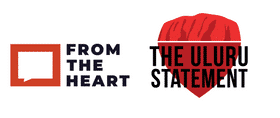 In May 2017, over 250 Aboriginal and Torres Strait Islander delegates from all points of the Southern Sky issued the Uluru Statement from the Heart to the Australian people, which invited the nation to create a better future for all of Australia.
In May 2017, over 250 Aboriginal and Torres Strait Islander delegates from all points of the Southern Sky issued the Uluru Statement from the Heart to the Australian people, which invited the nation to create a better future for all of Australia.
The Uluru Statement campaign has developed a training course which explores the first of these proposed reforms: enshrining an Indigenous Voice to Parliament in the Australian Constitution.
In the course, you’ll discover what is meant by Indigenous Constitutional Recognition through a Voice – and what a Voice to Parliament is, and is not. You will also learn why a Referendum is required to make it happen. Click here to start the course.
Webinar: Child Poverty Reduction Act: The International Experience
The Valuing Children Initiative are developing a campaign to reduce child poverty in Australia and will be holding their first action with this webinar on Thursday, 29 June 2023 at 11am AEST.
Around the world we are seeing communities successfully campaign for their Governments to introduce a Child Poverty Reduction Act, namely New Zealand and New York. So, what can a Child Poverty Reduction Act achieve in ending child poverty in Australia? In this webinar you will hear from international speakers who are working to end child poverty through a Child Poverty Reduction Act on New York, The US and New Zealand. Speakers include:
- Vice President, Family Economics, Housing and Homelessness First Focus on Children Cara Baldari (Washington DC)
- President and CEO Schuyler Center for Analysis and Advocacy Kate Breslin (New York)
- Principal Analyst Child Wellbeing and Poverty Reduction Group Department of the Prime Minister and Cabinet New Zealand, Hugh Webb (New Zealand)
- Executive Director Anti-Poverty Week, Toni Wren (Australia)
Effective Online Group Leadership Workshop
SUNSHINE CIRCLES – Albury
SUNSHINE CIRCLES – Shepparton
HEY LITTLE WARRIOR – Sale
VIC
Family Dispute Resolution Practitioner (s) | Relationships Australia Victoria
Family Dispute Resolution Practitioner – Sunshine | Relationships Australia Victoria
NT
Family Dispute Resolution Practitioner (Full Time or Part Time) | Relationships Australia Northern Territory
Counsellor – Darwin – Full Time | Relationships Australia Northern Territory
Counsellor – Alice Springs – Full Time | Relationships Australia Northern Territory
If you have any events you’d like listed on the FRSA Events and Training Calendar or job vacancies you’d like listed on the FRSA Jobs Board, email Communications Officer, Vanessa Lam at communications@frsa.org.au. Please note that posting onto the FRSA website is reserved for FRSA Members only.

The role of depression in intimate partner homicide perpetrated by men against women: an analysis of sentencing remarks | Australian Institute of Criminology
This study explores the role of offender depression within a sample of 199 cases of male-perpetrated intimate partner homicide in Australia, as described by judges in sentencing remarks.
Care criminalisation of children with disability in child protection systems | Royal Commission into Violence, Abuse, Neglect and Exploitation of People with Disability
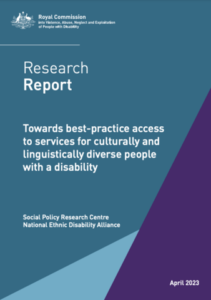 The Royal Commission into Violence, Abuse, Neglect and Exploitation of People with Disability commissioned this research to improve understanding of the pathways that lead children with disability from their contact with child protection system to entering the criminal justice system.
The Royal Commission into Violence, Abuse, Neglect and Exploitation of People with Disability commissioned this research to improve understanding of the pathways that lead children with disability from their contact with child protection system to entering the criminal justice system.
Prosocial behaviours and the positive impact on mental health | Australian Institute of Family Studies
This snapshot reports on the relationship between prosocial behaviours and mental wellbeing in children and young people.
Involving children in evaluation: what should you know? | Australian Institute of Family Studies
This guide outlines the reasons to involve children in program evaluation and includes some practical considerations and approaches to collecting data from children.
The new normal: changed patterns of dwelling demand and supply | Australian Housing and Urban Research Institute
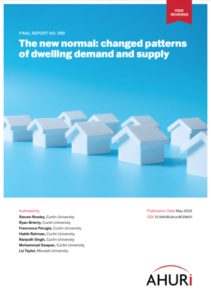 This research examines the impact of the COVID-19 pandemic on patterns of housing supply and demand, and how the Australian housing market has changed over recent time (including between the 2016 and 2021 Censuses).
This research examines the impact of the COVID-19 pandemic on patterns of housing supply and demand, and how the Australian housing market has changed over recent time (including between the 2016 and 2021 Censuses).
‘It’s Us, Or Maybe No One’: Yarning With Aboriginal Social and Emotional Wellbeing Workers From the Kimberley Region of Western Australia | Journal of Australian Indigenous HealthInforNet
This research paper presents findings from research exploring the experiences of Aboriginal Social and Emotional Wellbeing (SEWB) workers employed within Aboriginal Community Controlled Health Organisations (ACCHOs), using a yarning methodology. The authors describe enablers, challenges, and requirements of growing a sustainable and empowered SEWB workforce.
Establishing a Community of Practice | ARACY
ARACY developed this guide to fill a gap of a succinct document capturing the fundamentals around Communities of Practice (CoP) for an Australian audience. Although multiple resources exist outlining the basics of creating and maintaining CoPs, they tend to consist of lengthy documents, or in various website pages and from an American or United Kingdom perspective.
Reproductive coercion and abuse | Australian Institute of Family Studies
This practice guide describes the evidence on reproductive coercion and abuse (RCA). It includes tips for supporting clients who may be experiencing RCA.
Final evaluation of Eastern Community Legal Centre’s Elder Abuse Response Programs – ROSE and ELSA service trials | Eastern Community Legal Centre
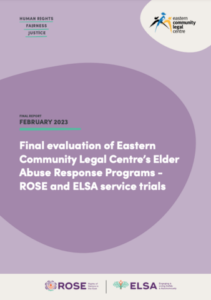 These reports share key lessons for service providers delivering elder abuse services, advocate for the expansion of integrated elder abuse services, and draw attention to systemic gaps that must be addressed in order for elder abuse to be resolved.
These reports share key lessons for service providers delivering elder abuse services, advocate for the expansion of integrated elder abuse services, and draw attention to systemic gaps that must be addressed in order for elder abuse to be resolved.
LGBTQ+ young people’s digital peer support for mental health | University of Technology Sydney
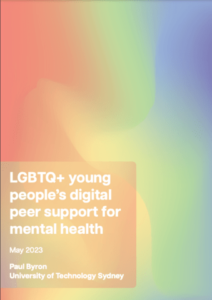 This report offers insight into what digital peer support means to LGBTQ+ young people and how mental health is negotiated – personally and collectively, through digital media.
This report offers insight into what digital peer support means to LGBTQ+ young people and how mental health is negotiated – personally and collectively, through digital media.
Mobilising evidence to enhance the effectiveness of child well-being policies: the role of knowledge brokers | OECD Publishing
This working paper sheds light on the best practices identified for mobilising evidence to enhance the effectiveness of child well-being policies, based on a stocktake of 81 knowledge broker organisations across 24 countries.
Want to submit something to the FRSA eBulletin?
If you have an news item or event that you would like to be featured in a future eBulletin please submit your announcement via the form below or email communications@frsa.org.au with the subject “FRSA eBulletin submission”.
Please note FRSA members receive priority for items posted in the eBulletin. And to keep information current, relevant and useful, submissions will not be repeated from week to week.
Subscribe
Subscribe to receive future eBulletin editions directly to your inbox!







